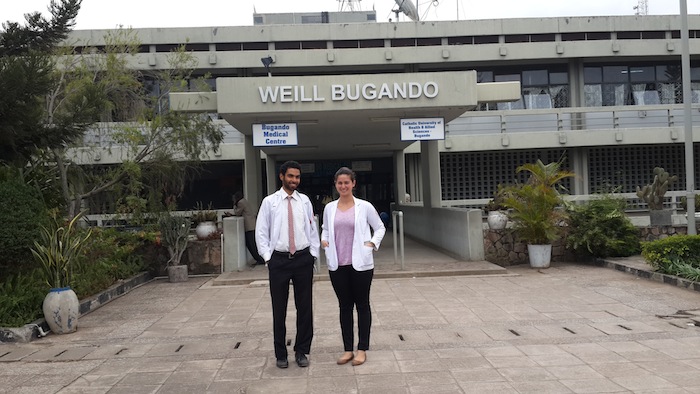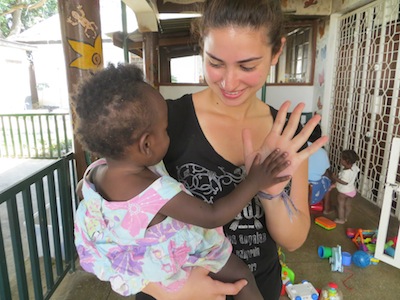Tanzania global health education and research program an eye opener for WCMC-Q students
October, 2013

Second-year medical students Ahmed Saleh and Lama Obeid worked at the Weill Bugando Medical Center in Mwanza, Tanzania for eight weeks during the summer break.
Two students from Weill Cornell Medical College in Qatar (WCMC-Q) returned from a challenging global health education and research program in Tanzania determined to do more for the sick and poor in under-resourced developing nations.
Second-year medical students Ahmed Saleh and Lama Obeid spent eight weeks of their summer break in Mwanza, the second biggest city in Tanzania, where they worked at the Weill Bugando Medical Center. WCMC-Q’s Department of Global and Public Health sponsors two medical students every year during the summer break for a global health education and research experience. This is the third group of WCMC-Q medical students to participate in the program.
Ahmed found significant health issues in Tanzania, as in most developing countries. “There is a lot that can be done to enhance the limited medical services that are provided in Tanzania and elsewhere. Health education is a key element. I believe it is our duty as medical professionals to limit the spread of infectious diseases by spreading awareness among the public,” Ahmed said.
“Being in an environment where resources are very limited challenges you to explore other options. This was a great learning opportunity as it teaches you how to look at things in different ways. You have to come up with a diagnosis based on history and physical examination without having any modern testing modalities and this helps you to move a step higher in rationalizing your decisions and diagnoses.”
For Lama, the visit was an opportunity to observe at close range the treatment and effects of infectious diseases such as malaria and TB and other rare infectious diseases. At the same time it was an opportunity to experience the African traditions and lifestyle.
Lama Obeid said the visit was an opportunity to experience
African culture and traditions as well to observe the delivery of
healthcare in a new environment.
“Mostly we attended morning reports and then went around the wards with the doctors and the medical students, checking on patients and discussing their medical problems. We were exposed to a wide range of procedures, and we learned a lot. Often it would be the sort of things you wouldn’t ever get to see because we come from a different part of the world,” Lama said.
“Tropical diseases were widely prevalent and seen mostly in late stage because people cannot afford to visit the hospital often. The patients are mainly poor and unable to buy medication. They rely mostly on traditional healers and herbal medicine, which is a big challenge modern medicine faces in such communities. Resources are very limited.”
WCMC-Q Associate Dean for Global Public Health, Dr. Ravinder Mamtani said the program provided participants with an excellent foundation in global health and clinical research in a part of the world where healthcare resources and treatment options are limited.
“These are experiences that you can only gain when you have been put in those situations,” Dr. Mamtani said. “This kind of training is unique and not a substitute for knowledge you gain in high-income nations. Providing this opportunity affirms our commitment to enhance and augment the education experience of our students.
“You will not be able to gain this type of learning by sitting in Qatar or in the United States. It is an amazing opportunity for our students. It sharpens their clinical skills and diagnostic abilities”.

